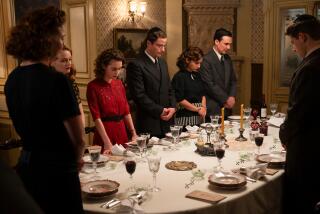TV Reviews : ‘The Fortunate Pilgrim’ Unfortunate for Viewers
Mama mia! Just look at the sorrows a mother must put up with, when that mother is Sophia Loren in an epic new TV movie called “The Fortunate Pilgrim.”
An Italian immigrant in New York City, circa 1915, Loren suffers, among other travails, these:
--Her husband is blown up in a factory accident.
--A relative tries to snatch away her baby.
--Her other children grow up to be nothing but trouble, trouble, trouble.
--The landlord is constantly threatening her over back rent.
--And her mysterious new husband acts weird, eventually leaves, then returns (as a Baptist!) to rant and rave like a madman.
Basta! But no, that’s only Sunday’s initial two hours (beginning at 9 p.m on Channels 4, 36, 39). Only the hardiest viewer will want to stick around for Monday’s three-hour wrap-up (8-11 p.m.).
For all its big names--including Mario Puzo (original novel), Carlo Ponti (executive producer), Edward James Olmos (as the second husband) and, though he doesn’t show up until Part 2, Hal Holbrook--most of “Pilgrim’s” long, long scenes just lay there like strands of overcooked linguini. Minus sauce.
Director Stuart Cooper (“A.D.”) and cinematographer Reginald H. Morris (“Porky’s”) have given “Pilgrim” a lush look, with an assist from the money people, who constructed a believable Old New York set in, of all places, Yugoslavia.
However, Cooper’s sl-o-o-w hand and screenwriter John McGreevey’s competent but zest-less script make “Pilgrim” more of an endurance test than the quasi-”Godfather” it wants to be.
One thing “Pilgrim” never lacks is good acting: Loren is consistently fine as Lucia Angeluzzi, Olmos--currently getting raves for “Stand and Deliver”--is mesmerizing as the laconic yet complex Frank Corbo, and the other players give believable, sometimes intense performances--notably John Turturro as oldest son Lorenzo, a.k.a. Larry. (Every effort seems to have been made to Americanize the Angeluzzis as fast as possible; don’t look here for rich ethnic touches.)
The “Fortunate” in the title is obviously meant to be ironic: an immigrant’s life in America is portrayed as a nightmare, not without basis. But any idea of “the fortunate viewer” is ironic, too. Despite all the big-league names and big bucks lavished upon it this bloated nightmare is a big snooze.
More to Read
The complete guide to home viewing
Get Screen Gab for everything about the TV shows and streaming movies everyone’s talking about.
You may occasionally receive promotional content from the Los Angeles Times.






